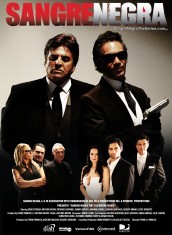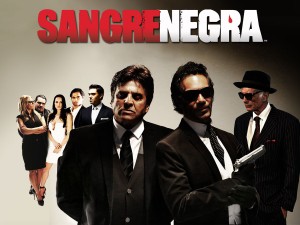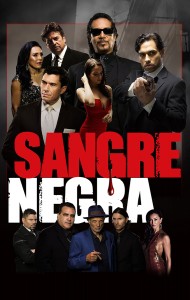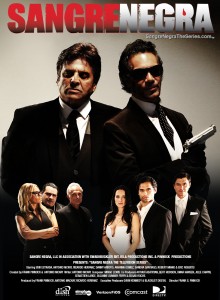SANGRE NEGRA translates as “black blood.” It is also the title of a new English-language telenovela series on the free streaming service Tubi. Created by executive producers Antonio McKay and Frank Pinnock, SANGRE NEGRA focuses on the three Santos brothers – ambitious mob boss Tony, played by McKay, defense attorney Guillermo Jr., played by Ricardo Herranz, and police detective Christian, played by Danny Arroyo – as well as their father, Guillermo Sr., played by Erik Estrada.
In a telephone interview, McKay and Herranz talk about SANGRE NEGRA.
There are two separate entries on IMDB for SANGRE NEGRA. McKay explains the history of the series. “Basically, SANGRE NEGRA started because of a frustration from another project we [McKay and Pinnock] were doing, called FORBIDDEN. That project dragged on for a few years, we got so close, and we fell back down. It’s a typical Hollywood story. And so, myself and Frank Pinnock were sitting in a Coffee Bean at the Grove, and we just got fed up. We said, ‘We’ve got to film something, let’s just film something.’ And at that time, Web series were a big deal. So, we said, ‘Let’s just film a Web series’.”
McKay continues, “So, we came upon this idea of taking the best aspects of DALLAS and THE SOPRANOS, the family and the Mafia, put it together, and give it a Latinx spin. Because I’m part Black and part Hispanic, we needed another Hispanic person to give it that really full Spanish feel. We’ve both known Ricardo for a long time. So, we took our idea, and we solidified it, and that’s basically how it started.”
Herranz recalls, “Frank and Tony were doing exactly what Tony was saying – brainstorming, creating this, trying to complete this project, and they gave me a call, saying, ‘You know what? We have an idea. We want to run it by you, see what you think. And it shouldn’t be long, a matter of thirty minutes or so for us to tell you what we have, and tell us what you think.’ ‘Sure, come over’,” Herranz laughs. “They came over, and the thirty minutes turned out to be five-and-a-half, six hours of brainstorming, with beautiful scenarios of different possibilities, with family connections, with Mafia, with overseas connections, with all kinds of ideas. When something truly has potential, all it takes is just the right watering. And something that was supposed to take thirty minutes suddenly was six hours, and from six hours, went onto the Web series, and from the Web series, it was so well-accepted, so many people that we spoke to about the project, that they said, ‘You know what? We’ll back you up. We need to turn this into a TV series, because this idea is way too good to just leave it on that short fragment of a Web series. We need to expand it.’ Pretty much, that’s how it began.”
As to why there are separate IMDB listings for the Tubi series and for Webisodes, McKay relates, “The Webisodes were originally were going to be five minutes each, but we never really shot one. As soon as we started filming the first Webisode, I came upon an opportunity to get Erik Estrada to play the father, and once that happened, we said, ‘Okay, once we have Erik Estrada, this is too big for a Web series.’ So, we just decided to go out and get more money, and just make it a pilot. That’s how the first episode started. So, the Webisodes never even got done.”
The first season is eight episodes long, although there was quite a gap between the start of production and the current SANGRE NEGRA series, McKay elaborates. “We started filming in 2014, and we finished off the first episode. But what happened is, once we started filming the other episodes, we had a person in charge of our social media at that time who started putting up all the episodes we were filming, even though they weren’t ready for release. That’s how the confusion started, and the [IMDB] dates started going wrong. So, that why recently, you see the brand-new SANGRE NEGRA with the correct dates, starting in 2021, when they went up on Tubi.”
Herranz describes the premise of SANGRE NEGRA. “This show is about the most powerful family on the West Coast, which happens to be of Hispanic descent, connected to everything and everyone, from politics to economics, to even organized crime. The leader of the family is the patriarch, Guillermo Santos, Sr. He has three sons. One son [Ricky] he had when he was late teens, with a girlfriend he had, who happened to be black. Ricky wants to be the next Godfather, controlling all the organized crime and mafia of the West Coast. And then [Guillermo Sr.] went on to marry another person, and had [Guillermo Jr., played by] me, the middle son, the lawyer of the family. I was a prosecutor, then turned defense attorney, and that’s what my father criticizes me for, for becoming a defense attorney and defending guys that we were prosecuting before.”
As for the third son, Herranz continues, “Our father went on to marry another woman, and had our younger brother, Christian, who then turned out to be one of the elite detectives in the LAPD, and sworn enemy of the oldest brother. So, me, being in the middle, I keep the balance between good and evil. Those are the three main characters, along with Erik Estrada, obviously, and Eric Roberts.”
It doesn’t take long for Ricky to need Guillermo Jr.’s legal services. “That happens in the very first episode,” Herranz reveals.
“The first time, he’s on my payroll,” McKay adds.
In real life, McKay is the one who was almost a lawyer. It’s not so much that this was his original career goal, but, he laughs, “My parents started out wanting me to be a lawyer. I always wanted to be an actor, I just didn’t have the guts to tell people. I was afraid I would be laughed out of my house. But once I graduated from college early, I went to law school, everything was fine, midway through my second year, I just decided, ‘You know what? This is not for me. All I’m thinking about is, I should be in Los Angeles, going after what I really want to do.’
“So,” McKay continues, “I finally broke it to my parents. Needless to say, they weren’t too happy. But a credit to them, they supported me. I always thank them for that. Unfortunately, they both passed now, and the series happened a little after. Hopefully they’re up there, watching it.”
“They’re partying in Heaven,” Herranz says of McKay’s parents. “[McKay has] achieved something that is very hard, to create a TV series. And connect that to the fact that we are privately financed, and not supported by a main studio, or a main corporation, or a main person who puts all the money, that becomes quite a challenge. So, his parents have got to be very, very proud.”
Herranz says he originally wanted to be a scientist. “I went to college for organic chemistry and analytical finance. I got both degrees. Once I graduated, I went back to Venezuela. My incursion into acting was pretty much a fluke.”
The circumstances, Herranz elaborates, were that, “At that time, my father was one of the co-owners of the Wrangler Jeans Company in Venezuela. They were having a major fashion show, introducing a new line. The two main models were Miss Venezuela, at the moment, who happened to be Miss Universe, also, at the same time, and the guy that they called Mr. Venezuela.”
And then, “Something happened to the guy at the very last moment, hours before the whole thing started, and he couldn’t make it. My dad came to me and said, ‘Listen, I know that you’ve done modeling before, and a bit of acting here and there when you were in college, nothing serious, but we have this problem now. So, would you mind stepping in, and doing the part of this guy in the fashion show?’ It’s my father, I’m going to say, ‘Of course. Yes.’ So, I did it.”
The show itself was a success, and Herranz met a number of Venezuelan television executives at the after-party. One of the executives invited him to meet with a network casting director the following day. “I went there, the interview turned out to be quite nice, and they basically gave me a year’s worth of studies in a very prestigious dramatic arts school in Venezuela. From there, they immediately connected me to one of their main soap operas, and that’s how everything started for me. I started working from one production to the other, and I did not stop working for ten years.”
McKay sounds surprised. “That’s the first time I ever heard that story.”
“Oh, wow,” Herranz laughs. “We’ve known each other for almost twenty years.”
How did Herranz and McKay meet? McKay defers to Herranz on this one.
“We met pretty much by fluke also,” Herranz says. “I was living with my wife in the Madison, at the time, pretty much the highest high-rise building in Hollywood, a nice residential building that is wall-to-wall with the Kodak Theater, literally, so you actually can look out the window and see the people going to receive the Oscars from the window of where we lived.
Back then, the Madison building manager was Bert Hickson, a mutual friend of McKay and Herranz, who plays Leo Brown in SANGRE NEGRA. “So,” Herranz explains, “Bert and my wife Maura were working in the manager’s office; my wife was his assistant at the time. Tony and Frank were creating FORBIDDEN, and Bert was associated with them in the creation of that project, as an executive producer. Tony and Frank came into the office frequently, to talk about what was going on, and that’s how we met.”
McKay says that he and Pinnock tried to balance research with a good narrative. “I definitely did research definitely into organized crime, but I also went to law school for almost two years, so I learned a little bit about the basics. And finally, I watch a lot of TV,” he laughs. “So, combine everything together, and you get what I think is a compelling story. It’s a little farfetched, of course, but to me, if film and television fictional stories are not a little farfetched, it just becomes kind of dull and routine. You have to stretch your imagination, and allow the audience to go on that ride with you, and as long as they’re willing to take the ride, I think they have a lot more fun than if there’s, ‘Oh, well, they wouldn’t do that.’ That becomes more of a critics’ game.”
“It’s not so much the content of the material,” Herranz adds, “or how well the research could have been done, it’s how well-explained it is, how you justify the information in the scene, and how well you create the dialogue. That’s Tony’s forte, which is what makes the scene compelling. More than the investigation, it’s the delivery of the material for how he has structured the actual dialogue.”
In creating SANGRE NEGRA, McKay says that he already knew he wanted to play Ricky. “So, there were two other roles left.”
“Tony gave me the choice to play the lawyer or the detective,” Herranz says. “I was pretty much the only one who had a choice. I said, ‘Let’s go for the lawyer’.”
“That left the younger brother,” McKay relates. So, we had to audition for the youngest brother, and came up with Danny Arroyo, and he’s done a fine job.”
McKay notes that having a Spanish-language title on an English-language show is meant to help SANGRE NEGRA appeal to both Spanish-speaking and non-Spanish-speaking viewers. “It was always going to be an English[-language] show. The term ‘sangre negra,’ which of course means ‘black blood,’ is basically kind of a play on our whole situation. Yes, it’s a Latinx-based populace, but my character is also part-Chicago African-American, to go along with the Venezuelan side from my father.”
Herranz points out that in the first episode, Estrada’s character “utilizes that term in connection to the crime, and the level of criminality in the city, that the crime in the city run freely, like black blood, like sangre negra.”
“That’s basically how the name reverberates throughout the whole series,” McKay observes.
Season 1 of SANGRE NEGRA was shot primarily in Los Angeles, with some work done in Vegas. For Season 2, McKay says, “We’ve already got offers from Puerto Rico, to film down there. They’re very interested. We’re also in negotiations, as we speak, with three very high-powered, well-known streaming networks, as well as regular networks.”
What would McKay and Herranz most like people to know about SANGRE NEGRA?
First of all, McKay wants to emphasize that the series can be watched for free. You can get Tubi on your computer, your phone, or your smart TV. It’s basically an app.”
Herranz says, “My take is from the point of view of what has worked most successfully. [A] movie franchise that has been able to go for nine different movies, and each one of them makes more money than the previous one, is THE FAST AND THE FURIOUS. The first made good money, the second even better, the third even better, and they kept improving. So, what’s their secret? Most TV shows and movies use the classic representation of an individual lead or a lead couple that are either Caucasian, or they’re Black, or they’re Latinos, or they’re Asians, they’re very compartmentalized, and specific. And then they have other characters representing ethnicities, but in secondary roles.”
Herranz continues, “What [the F&F franchise] did was, they created an entire spectrum of characters that were all equally important. And each one of them represents a different demographic. Everybody is represented there at an equal level of importance. When you do that, then you create a higher level of identification by a broader spectrum of people, in which anywhere, truly, in the world, people watching a show like that can basically connect, because there is someone that they either love or hate that can connect to their demographic. And, if you translate that into a TV series, that is exactly what we did.
“Because when you look at the full cast of SANGRE NEGRA, we have a very broad spectrum of lead actors, and they are all of different ethnicities, representing pretty much the broadest spectrum possible of demographics, in order to make everybody feel as important as everybody should be, because the importance of a character should not be connected to a color. It should be connected to the content of the character, and the psychology of the character. And when you do that, you spread that importance among the wide spectrum of demographics.”
McKay observes that FAST & FURIOUS franchise leads Vin Diesel and Dwayne Johnson both come from multi-ethnic backgrounds. “That helps. When you have a lead character who’s [multi-ethnic], it allows a lot of people to claim them as their own. [In real life], my dad is Jamaican, my mom is Colombian, and so my character, I get to dip my foot in both sides.”
“In my case,” Herranz says, “my mother is from Madrid, Spain, my dad’s from Venezuela, and my grandmother from Marseilles, France, so we all have all these pools of blood in us. We’re kind of citizens of the world.”
McKay says, “What I’d like the most for people to take away from SANGRE NEGRA is to look at the diversity, and look at how people of all sorts of different cultures, and ethnic backgrounds, can come together in a series without any notion of anything other than being human. Good humans, bad humans, stupid humans, smart humans, beautiful humans, not so beautiful humans. Everybody is just human, put in this situation, and we’re a lot more alike than we are different, and I would like everybody to be able to relate to us as our characters. In other words, when somebody sees Ricky Santos, they should think of him the same way they think of maybe Michael Corleone, or Tony Montana, or anybody he reminds them of, and not worry about the actor playing him. We want everybody to be able to just enjoy it, and not have to think about anything else. It’s basically entertainment. I want people to be able to sit down, binge-watch all eight hours of it, and just come out saying, ‘Wow, that was quite a ride. I love it’.”
Follow us on Twitter at ASSIGNMENT X
Like us on Facebook at ASSIGNMENT X
Article Source: Assignment X
Article: Exclusive Interview with SANGRE NEGRA co-creator and star Antonia McKay and actor Ricardo Herranz
Related Posts:














